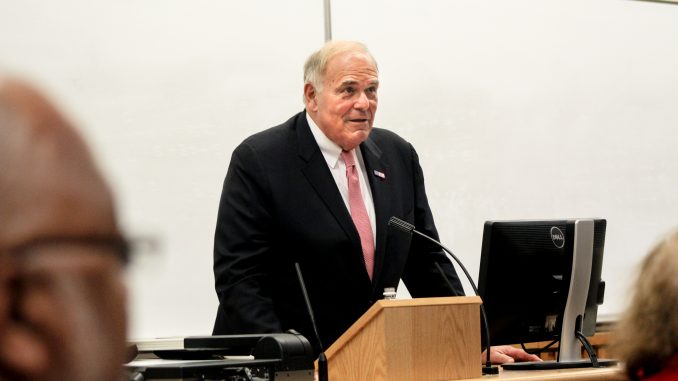
Former Pennsylvania Governor Ed Rendell addressed Temple students and faculty as the Featherman Lecture speaker in Gladfelter Hall on Nov. 12, where he focused on issues facing the “physical and intellectual infrastructure” of the United States.
Rendell, who served as Philadelphia District Attorney from 1978-85, Mayor of Philadelphia from 1992-2000 and Governor of Pennsylvania from 2003-11, addressed what he believes needs to be done to keep the country “competitive” with other nations.
Rendell also stressed the importance of tax money in order to maintain and improve infrastructure, noting the advanced age of Philadelphia’s sewer system and the inferior U.S. rail line system compared to high speed rail lines in countries like Japan.
“Money matters in everything,” Rendell said.
Similarly, Rendell warned that the lack of spending on education would have negative results.
“Conservatives will tell you that government spending on education does not necessarily lead to results,” Rendell said. “And they’re right. But not spending money absolutely guarantees bad results.”
Rendell called for the funding of education for 3- to 7-year-olds, as well as paying teachers salaries that compete with private sector jobs, citing Finland’s highly-touted education system as an example.
Rendell also challenged politicians currently holding office. “We’ve elected a bunch of cowards,” Rendell said.
He continued by criticizing Republicans, saying the party’s “Government is the enemy” mantra has worsened the political landscape. “Some government is as necessary to this country as oxygen is to all of us,” Rendell said.
Rendell also called for politicians to vote for what they believe in, and felt that elected officials need to be held accountable by their constituents.
“I’ve never believed in term limits,” Rendell said. “But maybe we need them.”
Rendell then fielded questions from students on a number of issues.
One student asked Rendell why he chose to move the Barnes Foundation Art Collection to Philadelphia from Lower Merion, and “break the spirit of Alfred Barnes’ will.” Rendell answered by saying that Barnes’ will allowed the collection to be moved if the Lower Merion location was no longer financially viable. Rendell claimed that neighbors creating limitations on hours of operation and parking at the former location caused financial hardship, and added it was these individuals who “bitched when it moved.”
Rendell also said he was surprised that younger citizens don’t participate in elections.
“I am stunned that young people don’t vote,” Rendell said. “In this election, almost no one voted between [the ages of] 18 and 35.”
Rendell then encouraged millennials to get out and vote, citing Obama’s 2008 Presidential campaign, where he said millennials voted 70-30 in favor of him, and cast 16 percent of his votes.
Rendell also talked about the School Reform Commission, and said he believes that power should be returned to the mayor for school board appointments. However, Rendell also said he was opposed to the idea of an elected school board, saying that candidates would not be able to raise enough money for a campaign, causing voters to be misinformed and unable to vote for policy they preferred.
Rendell also commented on Mayor Michael Nutter’s rocky relationship with City Council, saying “the burden rests on the executive.” He called for the mayor to solicit City Council’s opinion before making decisions, and noted that because the mayor and Philadelphia City Council are mainly Democrats, it’s not a matter of different ideologies, but rather “personality divides” that cause the strife.
In response to his possible candidacy in the 2015 Philadelphia mayoral election, Rendell joked, “If you hear I’ve announced [to run] for mayor, shoot me.”
The Featherman Lecture, which started in 1991, gives politicians a chance to talk about both current and everlasting challenges facing the United States. Students and faculty who were in attendance had good things to say about the talk.
“Even though I don’t agree with him on most things because he’s a Democrat and I’m not, he had a lot of good things to say,” said Natasha Tax, a sophomore political science major. “I can see why he got as far as he did in politics. He had a lot of charisma. He was like a grandfather, you just wanted to hug him.”
“I thoroughly enjoyed it,” said Rachel Rempel, a freshman legal studies major. “I definitely agreed with a lot of things he had to say about education.”
Dr. Conrad Weiler, a political science professor, especially agreed with Rendell’s point on voter turnout.
“Voting does matter,” Weiler said. “Like [Rendell] said, if everybody voted we’d have a very different government. But people say, ‘Oh, it doesn’t matter,’ and then we end up with a crappy government.”
Christian Matozzo can be reached at christian.matozzo@temple.edu



Be the first to comment